Living Testimonies
I. “Bruxelles Invisible”
I. “Bruxelles Invisible”
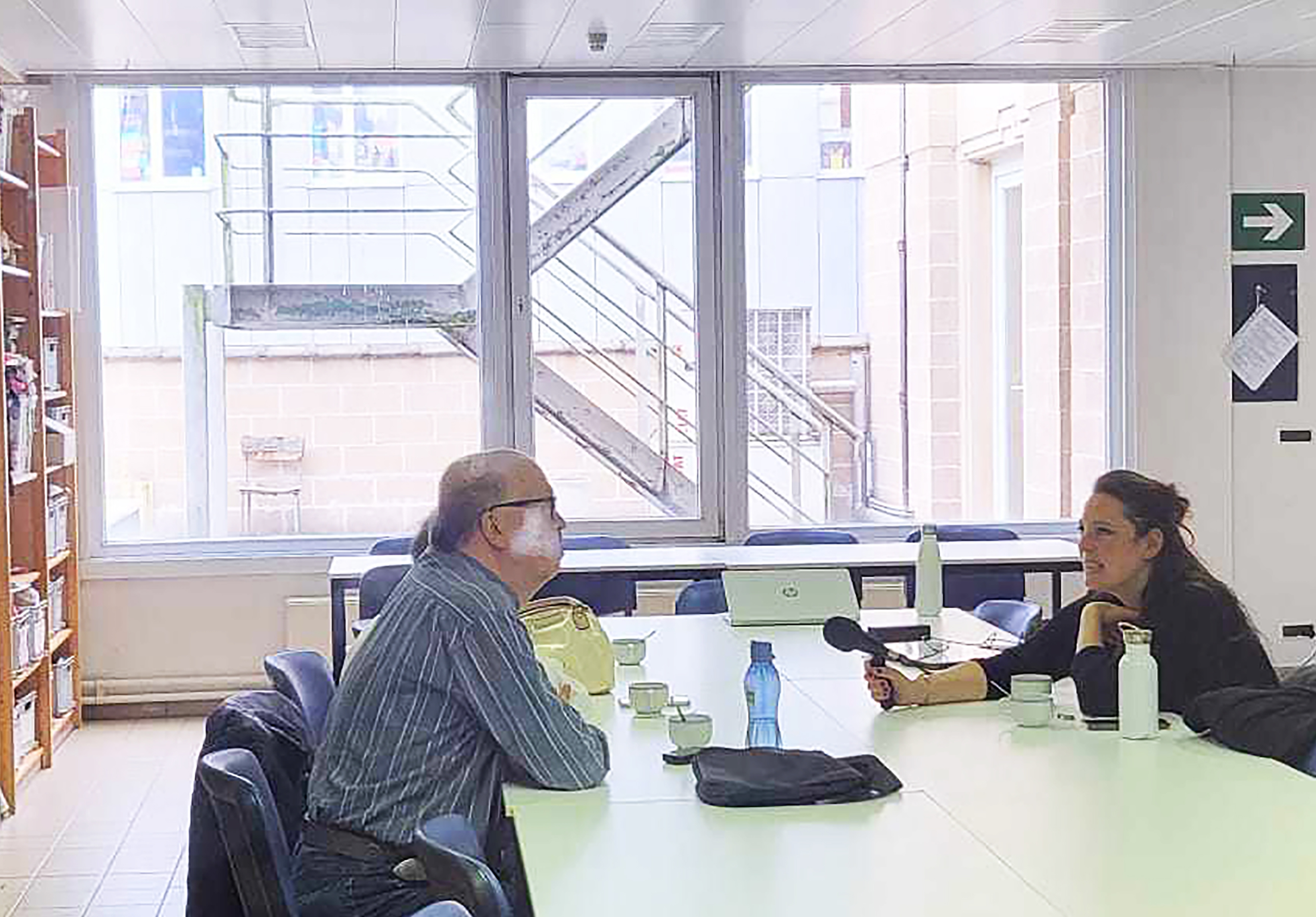
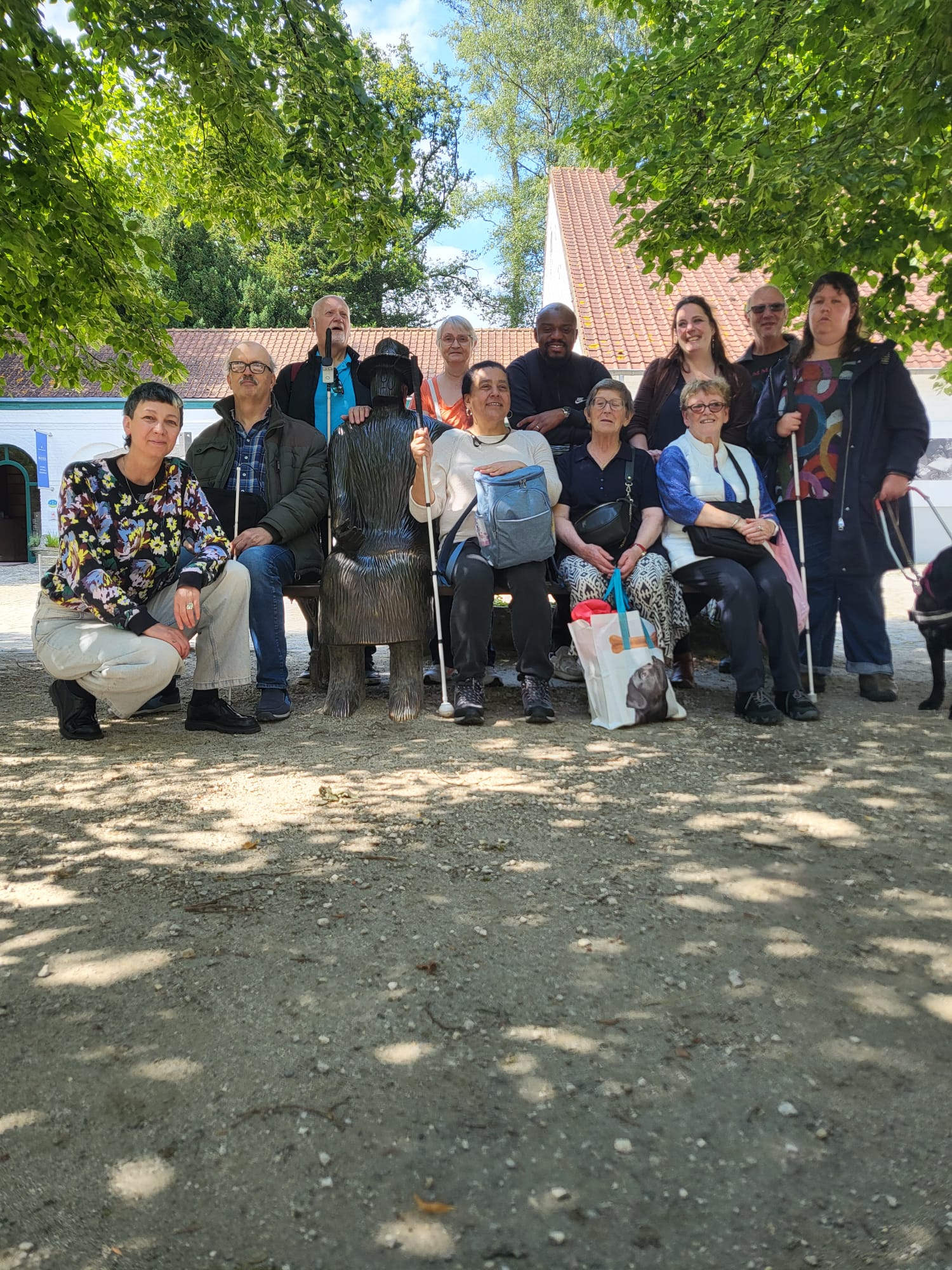
Living Testimonies
II. “Ressouvenirs”
II. “Ressouvenirs”
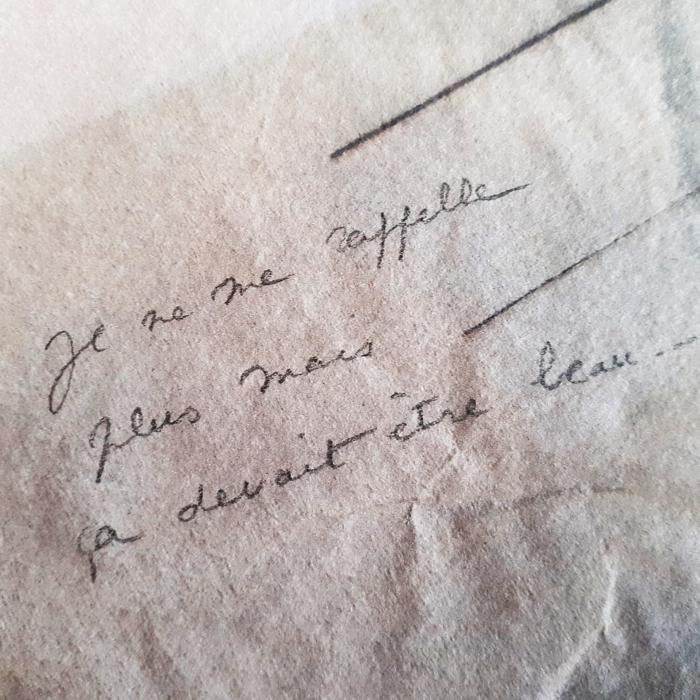
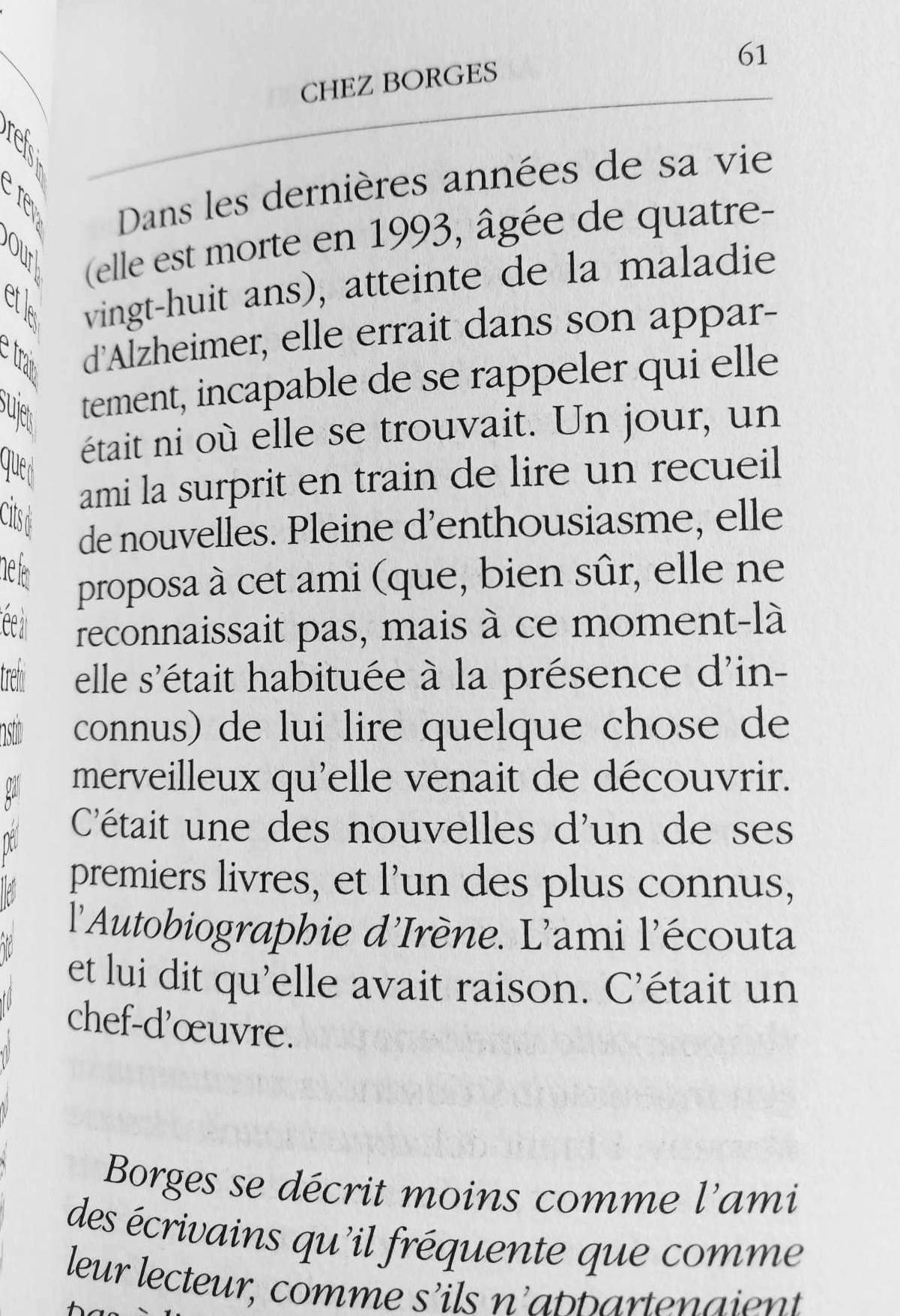
Notes
1 Synopsis - The installation ‘Invisible Brussels’ is the result of numerous meetings with visually impaired people who shared their perceptions and feelings about Brussels and its neighbourhoods, but also about their disabilities.
These meetings took place at the Royal Institute for the Deaf and Blind (IRSA) and at La Ligue Braille in Brussels.
Techniques -
Soundcloud with recordings;
Exhibition of the installation ‘Bruxelles Invisible’ with listening stations;
Work in progress for a sound and tactile map and publication.
Collaboration - BNA-BBOT creates sound archives of the present by collecting, archiving and using testimonies, conversations and soundscapes.
Archives - Memories of teenagers from IRSA and seniors from La Ligue Braille
Datas - 2024 and on progress
Captions -
1/ Interview with Jean-Pierre at La Ligue Braille, November 2024
2/ Group picture during a visit of the Folon Foundation in Brussels as a part of the workshops, June 2024
To listen the testimonies - here
1 Synopsis - The installation ‘Invisible Brussels’ is the result of numerous meetings with visually impaired people who shared their perceptions and feelings about Brussels and its neighbourhoods, but also about their disabilities.
These meetings took place at the Royal Institute for the Deaf and Blind (IRSA) and at La Ligue Braille in Brussels.
Techniques -
Soundcloud with recordings;
Exhibition of the installation ‘Bruxelles Invisible’ with listening stations;
Work in progress for a sound and tactile map and publication.
Collaboration - BNA-BBOT creates sound archives of the present by collecting, archiving and using testimonies, conversations and soundscapes.
Archives - Memories of teenagers from IRSA and seniors from La Ligue Braille
Datas - 2024 and on progress
Captions -
1/ Interview with Jean-Pierre at La Ligue Braille, November 2024
2/ Group picture during a visit of the Folon Foundation in Brussels as a part of the workshops, June 2024
To listen the testimonies - here
2
Synopsis -
Stimulate memory, accompany people in their reminiscences, happy memories.
‘Ressouvenirs’ is an immersive installation created from the memories of people with Alzheimer's disease and residents collected in 2023 in the nursing homes of Chambon-sur-Voueize and Evaux-les-Bains in the Creuse region.
Techniques -
Multidisciplinary exhibition consisting of recordings of residents, interviews with the team, as well as memory maps, installations dedicated to specific participants with their memories, etc.
Datas - Exhibition at La Maison des Patrimoines, Bénévent-l’Abbaye (FR)
Captions -
1/ "I don't remember anymore, but it must have been beautiful," fragment from the work "Pieces of Paper" where torn pieces of paper repeat phrases collected from elderly people with Alzheimer's disease in nursing homes about their love stories
2/ Extrait de «Chez Borges» d’Alberto Manguel (2003) exposé discrètement au coeur de l’exposition «Ressouvenirs», 2025 Translation: “In the last years of her life (she died in 1943 at the age of ninety-eight), suffering from Alzheimer's disease, she wandered around her apartment, unable to remember who she was, nor where she was. One day, a friend caught her reading a collection of short stories. Full of enthusiasm, she offered to tell this friend (whom, of course, she did not recognize, but by this time she had become used to the presence of strangers) something wonderful she had just discovered. It was one of the stories from one of her early books, and one of her best known, Irene's Autobiography. The friend listened and told her she was right. It was a masterpiece.“
To listen the testimonies - here
‘Ressouvenirs’ is an immersive installation created from the memories of people with Alzheimer's disease and residents collected in 2023 in the nursing homes of Chambon-sur-Voueize and Evaux-les-Bains in the Creuse region.
Techniques -
Multidisciplinary exhibition consisting of recordings of residents, interviews with the team, as well as memory maps, installations dedicated to specific participants with their memories, etc.
Datas - Exhibition at La Maison des Patrimoines, Bénévent-l’Abbaye (FR)
Captions -
1/ "I don't remember anymore, but it must have been beautiful," fragment from the work "Pieces of Paper" where torn pieces of paper repeat phrases collected from elderly people with Alzheimer's disease in nursing homes about their love stories
2/ Extrait de «Chez Borges» d’Alberto Manguel (2003) exposé discrètement au coeur de l’exposition «Ressouvenirs», 2025 Translation: “In the last years of her life (she died in 1943 at the age of ninety-eight), suffering from Alzheimer's disease, she wandered around her apartment, unable to remember who she was, nor where she was. One day, a friend caught her reading a collection of short stories. Full of enthusiasm, she offered to tell this friend (whom, of course, she did not recognize, but by this time she had become used to the presence of strangers) something wonderful she had just discovered. It was one of the stories from one of her early books, and one of her best known, Irene's Autobiography. The friend listened and told her she was right. It was a masterpiece.“
To listen the testimonies - here
Chapter (4)
~
Living Testimonies:
Giving Voices to the Invisible
“We must
close our eyes
to see.”
– James Joyce
– James Joyce
In this section, Claire Ducène explores memory through those whose voices are often silenced or obscured.
With Bruxelles Invisible, she embarks on a journey that brings forth another form of cartography: Brussels is mapped out through the stories, memories and favourite places of visually impaired people. This project composes a sensitive atlas, a city recomposed by their perceptions, where landmarks shift and contours are redrawn as the voices unfold.
And with Ressouvenirs, carried out with elderly people with memory loss and people with Alzheimer's disease, she collects intimate accounts of love stories or memorable moments that mark a lifetime. The very term ressouvenir — “to remember, to evoke again” — conveys the spirit of the project: it is less about faithfully restoring the past than about welcoming the fragments that remain, those that are replayed through the narrative, sometimes fragmented but always charged with emotion.
These words, collected over time and with kindness, give a voice and a place back to those whom the disease tends to erase.
For years, she wrote private biographies for others, with no intention of publishing them. In the short story Ghostwriter Library, she explores this practice: that of a writer whose presence fades behind the stories of others, embracing voluntary invisibility. Claire takes a back seat to better bring out the voices of others.
Whether it's voices weakened by illness, perspectives that compose a city differently, or stories written in the shadows for others, her work weaves a constellation of living archives.
Here, giving voice is not about filling a void but offering a welcoming space, an active listening that allows these stories — intimate, fragmentary, invisible — to become shared memory.
With Bruxelles Invisible, she embarks on a journey that brings forth another form of cartography: Brussels is mapped out through the stories, memories and favourite places of visually impaired people. This project composes a sensitive atlas, a city recomposed by their perceptions, where landmarks shift and contours are redrawn as the voices unfold.
And with Ressouvenirs, carried out with elderly people with memory loss and people with Alzheimer's disease, she collects intimate accounts of love stories or memorable moments that mark a lifetime. The very term ressouvenir — “to remember, to evoke again” — conveys the spirit of the project: it is less about faithfully restoring the past than about welcoming the fragments that remain, those that are replayed through the narrative, sometimes fragmented but always charged with emotion.
These words, collected over time and with kindness, give a voice and a place back to those whom the disease tends to erase.
For years, she wrote private biographies for others, with no intention of publishing them. In the short story Ghostwriter Library, she explores this practice: that of a writer whose presence fades behind the stories of others, embracing voluntary invisibility. Claire takes a back seat to better bring out the voices of others.
Whether it's voices weakened by illness, perspectives that compose a city differently, or stories written in the shadows for others, her work weaves a constellation of living archives.
Here, giving voice is not about filling a void but offering a welcoming space, an active listening that allows these stories — intimate, fragmentary, invisible — to become shared memory.
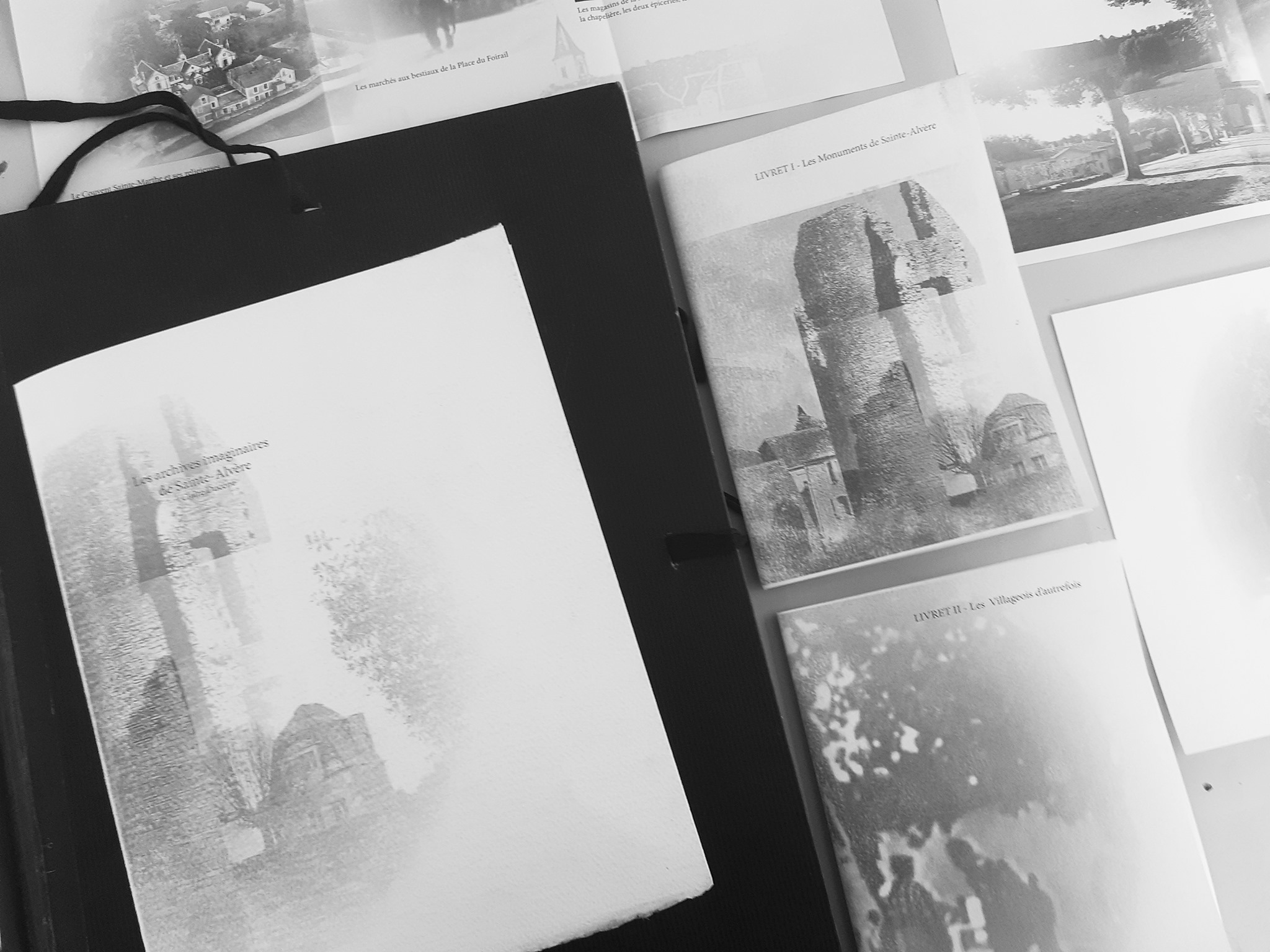
“The Imaginary Archives of Sainte Alvère”, a series of notebooks and recordings, 2021.
In a village in the Dordogne region, all the archives have disappeared. Based on encounters with and recordings of the villagers, Claire Ducène has reconstructed emotional archives about the inhabitants of the village.
In a village in the Dordogne region, all the archives have disappeared. Based on encounters with and recordings of the villagers, Claire Ducène has reconstructed emotional archives about the inhabitants of the village.
